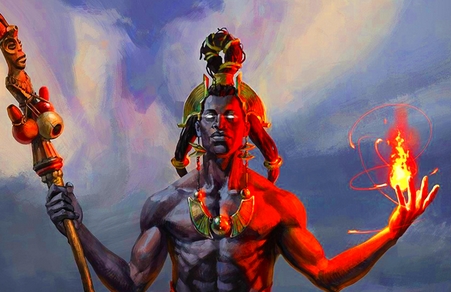
support@yorubalibrary.com
+2348073529208, 07038599574

In the pantheon of Yoruba deities, Eshu stands out as one of the most intriguing and complex figures. Known as the Trickster, Eshu is a deity of duality, communication, and change. His stories and myths play a crucial role in Yoruba culture, offering lessons on the unpredictability of life and the importance of adaptability.
Who is Eshu?
Eshu, also spelled Esu or Exu, is a multifaceted deity who embodies chaos, unpredictability, and the power of communication. He is often depicted as a mischievous figure who disrupts the status quo, challenging individuals to think and act differently. Eshu's dual nature makes him a deity of both trickery and wisdom, guiding and deceiving in equal measure.
Symbols and Attributes
Eshu is associated with several symbols and attributes that highlight his role as a Trickster and communicator:
• Crossroads: Eshu is often linked to crossroads, symbolizing choices, paths, and the intersection of different possibilities.
• Colors: Red and black are Eshu's colors, representing his dual nature and his ability to move between different realms.
• Objects: He is frequently depicted with a staff or a cowrie shell, tools that signify his power over fate and fortune.
Myths and Stories
Eshu's myths are rich with lessons and insights, illustrating his cunning nature and his pivotal role in Yoruba cosmology.
The Hat Story
One of the most famous stories about Eshu involves him wearing a hat that is colored differently on each side. Eshu walks between two friends, causing an argument when each friend insists that the hat is a different color. This tale teaches about the relativity of perception and the importance of understanding different perspectives.
The Trickster's Bargain
In another story, Eshu tricks a wealthy farmer into giving up his fortune. Eshu appears to the farmer in a dream, promising great wealth if the farmer sacrifices his current riches. Trusting Eshu, the farmer complies, only to find himself destitute. This myth highlights the themes of trust, faith, and the unpredictable nature of promises.
Role in Yoruba Religion
Eshu is not only a Trickster but also a vital intermediary between humans and the Orishas. He delivers sacrifices and prayers to the gods, ensuring that communication between the earthly and divine realms remains open. Without Eshu's intervention, it is believed that offerings and messages would not reach their intended recipients.
Lessons from Eshu
Eshu's myths offer several key lessons:
• Embrace Change: Eshu teaches that life is full of surprises and that adaptability is crucial.
• Understand Different Perspectives: His stories often emphasize the importance of seeing things from multiple viewpoints.
• Beware of Deception: Eshu's trickery serves as a reminder to be cautious and discerning in all dealings.
Conclusion
Eshu, the Trickster, occupies a unique place in Yoruba mythology. His stories are not just tales of mischief but profound lessons on the complexities of life and human nature. Through his cunning and wisdom, Eshu challenges us to navigate the uncertainties of life with intelligence and an open mind.

Learn about the Yoruba concept of Ìwà Pẹ̀lẹ́ (good…

Learn special praises for Divine Being and Creator…